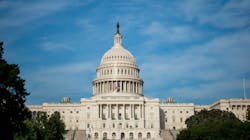Senate passes infrastructure package; moves to House for next steps
The U.S. Senate passed the Infrastructure Investment and Jobs Act with a vote of 69-30; Sen. Mike Rounds (R-SD) did not vote. The $1.2-trillion bill will now move to the U.S. House for consideration.
“After years and years and years of ‘Infrastructure Week,’ we’re on the cusp of an infrastructure decade that I truly believe will transform America,” President Joe Biden said following the vote.
The five-year bill includes $106.9 billion in funding for public transit and $102.1 billion for passenger and freight rail. According to analysis by the American Public Transportation Association (APTA), the transit funding consists of $69.9 billion in contract authority, $15.75 billion in General Fund authorizations for the Federal Transit Administration’s Capital Investment Grants Program and funding for the Washington Metropolitan Area Transit Authority and $21.25 billion in advance appropriations. On the passenger rail side, the funding includes $36.15 billion in General Fund authorizations and $66 billion in advance appropriations.
The legislation’s funding for public transit represents a 63 percent increase above current levels and the passenger rail funding represents a whopping 561 percent increase over current levels.
“Amtrak is ready to rebuild core infrastructure, replace equipment and, with the FRA and state partners, bring more Amtrak service to more people across the nation, creating thousands of new jobs and reducing America’s carbon footprint,” said Amtrak Board Chair Tony Coscia.
The bill was written and introduced at the beginning of August following negotiations with a bipartisan group of 10 senators.
Senate Republican Leader Mitch McConnell (R-KY), who did vote in favor of the bill, said its passage shows “that the Senate still works as an institution.”
The House was to stay in recess until Sept. 20, but reports state House Majority Leader Steny Hoyer (D-MD-5) could cut that short and call members back for an Aug. 23 session.
Industry reaction to the bill’s passage was mostly supportive.
“Rail is a clear winner in this bill, at long last demonstrating a federal commitment to breaking the inertia of the past and building the next generation of rail projects nationwide,” said Brightline CEO Michael Reininger.
“The historic and sweeping investments proposed in the infrastructure bill for public transit and rail can trailblaze a new future for our nation – one that unifies, transforms and defines the future of transportation for the world,” said California Transit Association Executive Director Michael Pimentel.
American Road & Transportation Builders Association President and CEO Dave Bauer said, “The U.S. economy and transportation system users stand to benefit most from enactment of an infrastructure bill that combines historic investment levels with pragmatic policy reforms. The Senate vote is a much-needed step, but not the finish line.”
There were some who did not believe the bill went far enough to address the climate crisis.
U.S. Rep. Peter DeFazio (D-OR-4), who chairs the House Committee on Transportation and Infrastructure and who wrote the House-passed Invest in America Act, said Congress is close to delivering “a big, bold infrastructure package” but said the bill “falls short when it comes to addressing climate change like the existential threat it is.”
Corinne Kisner, executive director, and Janette Sadik-Khan, chair of the National Association of City Transportation Officials (NACTO), applauded the “exciting safety, equity and climate-focused programs,” but said the funding would “prioritize building the infrastructure that most contributes to the U.S.’s worst-in-class safety record and extraordinarily high climate emissions: new highways.”
NACTO suggested the House make changes to the bill to add “a fix-it-first provision, strengthening performance measures and including more transit investment.”
-----
APTA has made a spreadsheet of transit funding and passenger rail funding included in the legislation available for viewing.
About the Author

Mischa Wanek-Libman
Group Editorial Director
Mischa Wanek-Libman is director of communications with Transdev North America. She has more than 20 years of experience working in the transportation industry covering construction projects, engineering challenges, transit and rail operations and best practices.
Wanek-Libman has held top editorial positions at freight rail and public transportation business-to-business publications including as editor-in-chief and editorial director of Mass Transit from 2018-2024. She has been recognized for editorial excellence through her individual work, as well as for collaborative content.
She is an active member of the American Public Transportation Association's Marketing and Communications Committee and served 14 years as a Board Observer on the National Railroad Construction and Maintenance Association (NRC) Board of Directors.
She is a graduate of Drake University in Des Moines, Iowa, where she earned a Bachelor of Arts degree in Journalism and Mass Communication.
